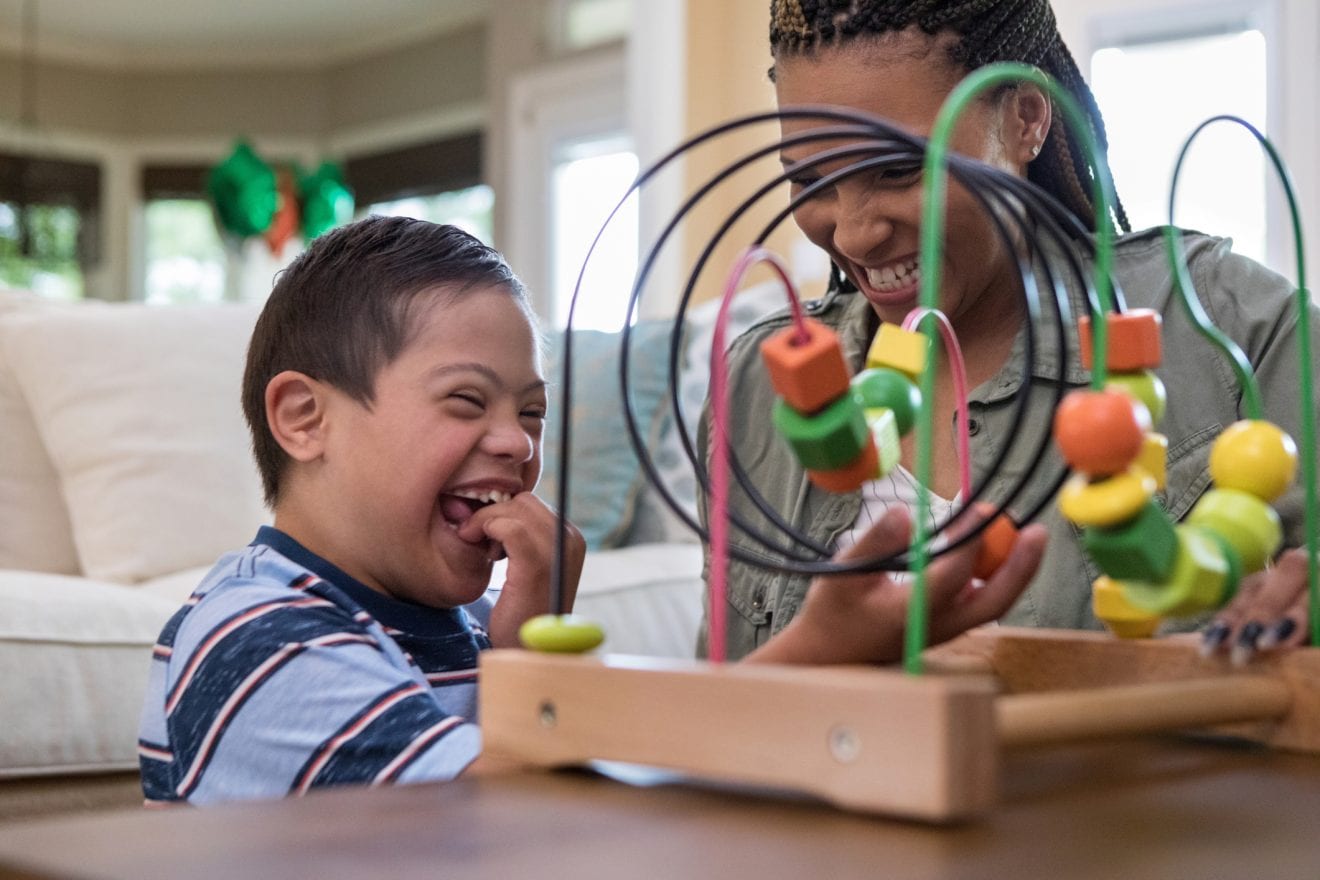In the midst of the COVID-19 pandemic, parenting has changed dramatically. For parents of kids with disabilities, interruptions in school, therapy appointments, and daily life present major challenges.1 However, these parents may actually know more about navigating pandemic life than parents who are used to readily available support networks. In families with kids with disabilities, there are certain stark realities, as well as potent joys.2,3 And during this pandemic, the wisdom of families with extra needs may provide useful insights into parenting during stressful times such as these.
Tips for Parenting During Stressful Times
Challenge: Isolation
Right now, many kids are feeling isolated from their friends, teammates, classmates, teachers, and their entire extended network of family and other support communities.4 They feel lonely, disconnected, and sad without the human exchange that comes with growing up in a strong community. And parents are feeling the isolation too.
For many families with medically fragile, chronically ill kids or who have physical, developmental, intellectual, or emotional disabilities, isolation is an ever-present reality. Most parents may take for granted that they can be out and about with their kids in the pre-pandemic world of movies, parks, swimming pools, restaurants, and grocery stores. But some parents of kids with extra needs are highly restricted in what they can do. Isolation can be the norm.5 And some parents are pros at figuring out ways to help their kids stay as connected to the world as possible.
Tip: Encourage kids to connect with the outside world in age-appropriate ways regularly. This may be through online gaming, weekly video conferencing with friends and family, or taking enrichment classes with live teachers and peers on topics that interest them.
Challenge: Anxiety
Every person on the planet now understands anxiety— how it feels, how it takes hold, how it changes us. It’s a daily feeling that’s hard to shake. As the COVID-19 pandemic continues to unfold, a whole new range of anxieties is beginning to surface in families. Kids may experience regressive behaviors, emotional outbursts, sudden fears, depression, or a lack of focus. And that’s okay. They are out of their routines. And their identities are being challenged now that most of their time is at home and away from peers and organizations.
Anxiety also comes from not knowing a definitive timeline for when things may go back to normal. And, of course, there is the anxiety of not knowing if it’s safe to do normal things. But for the parents of special needs kids, the anxiety of making sure that a child is safe and healthy 24/7 reality—not just during a pandemic. Like before, vigilance and advocacy become a way of life. These are muscles that have been toned for years.
Tip: Parents of kids with disabilities have learned the power of radical self-care, asking for help, finding a support system, and always prioritizing the mental and emotional health of their children and themselves above all else. Actively schedule consistent times to slow down and engage in rejuvenating activities like meditation, yoga, walking, reading, or resting and listening to music—even if only for a few minutes.6
Challenge: Lack of Choices
The ending of the traditional school year has, to put it mildly, put a huge wrench in families’ schedules. Many parents are asking what will happen to their kids if stay-at-home orders continue and camps are closed. Will families have to restructure their work and financial lives to care for the kids? Often, parents of kids with disabilities can’t get help from grandparents, family, or friends because their needs are so specialized. So, how will parents handle it all?
Parents of kids with disabilities know this drill inside and out.7 Their choices can be limited, if not completely unavailable, when it comes to securing childcare services, summer camp opportunities, or other experiences that come easily to most kids. During the pandemic, more families are now experiencing what it’s like not to have childcare options. And what it takes to create family systems that work. Parents of kids with disabilities want the rest of the world to reconsider what choices look like for everyone.8 What does accommodation really look like? And what does support look like? What does community really look like when so many kids aren’t included? How can we all be there for each other when times are difficult?
Tip: The solution? Tag team parenting allows one parent to watch the kids while the other completes work, chores, and self-care activities.9 Create a family schedule that works for everyone in the household and allows parents to get things done independently.
Challenge: Flying Solo
Parenting in stressful times requires friends! Parents are gathering online in record numbers to get information and advice on how to cope with being a full-time stay-at-home caregiver. They are trying to work out how to stay employed, provide education, and be a good parent. It seems impossible.
But for many parents of kids with disabilities, this is just another day. Some of these parents change their careers to have flexible schedules. Some downsize their lives and even homeschool their children if public schooling cannot meet their child’s needs. They spend hours in occupational, speech, physical, or other therapy every week. During the pandemic, these therapies are either greatly reduced or not happening at all, which means potentially losing critical progress from previous weeks and months. Their kids may rarely if ever, be invited to sleepovers, playdates, or parties. The parents have virtually no respite and spend a good chunk of time researching best parenting practices to address their kids’ disabilities.
The point is this: it can be done. Millions of American families find creative ways to make their lives work as they prioritize their children’s needs. It may be a different life than imagined. But a skills-based tiered approach is possible if love is at the center of the plan.
Tip: Become an expert in flexibility. You may have had strict rules about screen time or time chatting with friends. Now is the time to revisit some of those hard and fast rules and develop a plan that’s flexible enough to meet the emotional, psychological needs of the entire family unit. This is an extraordinary time that calls for a new way of doing things.
Challenge: Falling Behind Academically
As student life drastically changes, parents are also deeply concerned about kids falling behind academically.10 They want to make sure that children receive the appropriate educational supports they need to thrive and excel. They are worried that they may not be getting what they need to master subjects and fulfill their potential, particularly when in-person tutoring support is largely unavailable.
This is a common story for parents of kids with special needs. Parents around the country not only serve as teachers, therapists, and caregivers—they are also their children’s fiercest educational advocates. In a world that often misunderstands and judges a child, the parent fights for her while dealing with mountains of plans, paperwork, documents, appointments, and assignments. Parents painstakingly work with school districts to create individualized education plans (IEP) for students to have the best possible chance at achieving the same or similar milestones as their peers. Parents of special needs kids are experts in working with school administration to help structure plans that work.
Tip: Adjust your expectations. It’s not possible to replicate the traditional school experience at home—especially during uncertain times. Social/emotional learning will most likely take center stage as schools adapt to new protocols and academic benchmarks. Schooling through trauma makes it necessary to adjust expectations not only of your child but of his school. As you can probably tell from the number of emails and instructions you’re getting from teachers and administrators, you are essentially your child’s case manager now. Be patient.11
Remember to Celebrate These Important Things
Parenting during stressful times can be overwhelming. You may feel like you’re in survival mode. But for parents of kids with extra needs, there are periods in which the entire family is simply in survival mode even when there isn’t a pandemic. Persistent worries about school, work, childcare, education, and health are just part of everyday life. But, in the end, life with a child with extra needs provides profoundly beautiful life experiences. These are positive lessons that can serve as reminders to other parents who may be struggling:
Gratitude
With every new milestone or success, a deep feeling of appreciation surfaces that rivals any blue ribbon, gold medal, or towering trophy. Celebrate the many victories in your child’s life—big and small.
Mindfulness
When a child is struggling, being in the present moment is a powerful and intimate connection that is deeply bonding. Just cultivating the ability to breathe through it and disconnect from negative mind chatter is a life-changing life skill.
Joy
Prioritizing simple pleasures with your child like being in nature, listening to music, sharing a book, or playing in the water, can strengthen your relationship and creates a stream of positivity and trust.
Resilience
There is satisfaction in overcoming challenges. What might seem impossible today will become clear tomorrow. Don’t worry about small setbacks. Make a “ta-da” list instead of a “to-do” list and remind yourself that you have the ability to bounce back and move forward. Tomorrow is a new day!
Flexibility
When unexpected things happen, roll with it. Adjust your expectations and be ready to be okay with just a few successes in the day: eating one healthy meal or wearing clean clothes. You may not know how today will unfold, so remember the motto: the only constant is change.
Creativity
What works today may not work for tomorrow. There’s always something new to create that makes life easier or more fun—a game, a story, or a song. You are in control of creating new experiences.
Acceptance
Every person is unique. Their brains are unique, and so are their bodies and souls. Having the opportunity to learn deep and unconditional acceptance of others is one of the most beautiful and lasting gifts of parenting a child with disabilities. And during scary times, it’s important that we can lean on each other and discover new levels of empathy.
Patience
This is what life with kids is all about—helping them learn to be their best selves. You may be seeing sides of your kids that are new and unexpected. Parents of kids with disabilities learn early that behavior is communication. There are always reasons for struggles and for joy. This is one of the great gifts of parenting—to be able to slow down and really connect with who your kids are. Kids are not blank slates, after all. They are younger beings waiting to be discovered, and they need support and kindness above all else.
These are just some of the countless benefits and gifts of having a unique child!
Parenting during stressful times is hard. But it is doable! What works for kids with disabilities—support, patience, individualized attention, kindness— really works for all children. Perhaps parents of children without disabilities will have a much deeper understanding of what it’s like to parent in a world that’s not always accommodating.12 To strive for a new post-pandemic society that is good for all children may usher in a new way of life that leverages everyone’s strengths, abilities, perspectives, and contributions for the greater good.






























